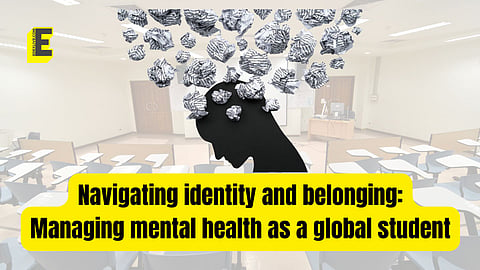

In an increasingly interconnected world, the experience of navigating identity and belonging is particularly relevant for global citizens.
Whether studying abroad, relocating for work, or simply engaging with diverse cultures, individuals often encounter significant challenges to their mental health. The journey can be rewarding, but it also requires careful management of one’s emotional and psychological well-being.
Understanding the landscape
As individuals step into new environments, they may experience culture shock — an emotional response to the unfamiliarity of their surroundings. This can manifest as feelings of isolation, anxiety, or confusion, especially when one’s identity is challenged or questioned.
For many, this experience is compounded by societal expectations and stereotypes that can lead to a sense of not belonging. According to the World Health Organization (WHO), mental health issues are on the rise globally, affecting approximately one in four people at some point in their lives.
Building a support system
One of the most effective ways to navigate these challenges is by creating a robust support system. This network can include family members, friends, mentors, or mental health professionals who understand the complexities of your situation. Engaging with individuals who share similar experiences can foster a sense of community and belonging.
Many educational institutions and workplaces offer resources such as counseling services, support groups, and cultural organisations. Leveraging these resources can provide additional avenues for connection and support during times of transition.
Creating a routine
Establishing a daily routine can significantly enhance mental well-being. A structured schedule not only provides a sense of stability but also helps manage stress by reducing uncertainty. Incorporate activities that promote relaxation and self-care, such as mindfulness practices or physical exercise.
Techniques such as meditation, deep breathing exercises, or even simple walks in nature can help ground your thoughts and emotions. These practices have been shown to reduce anxiety and improve overall mental health.
Prioritising physical activity
Movement matters! Engaging in regular physical activity is crucial for maintaining mental health. Exercise releases endorphins — natural mood lifters that can alleviate feelings of stress and anxiety. Aim for at least 30 minutes of movement each day; this could be anything from yoga to dancing or even brisk walking.
Ensuring quality sleep
Quality sleep is vital for mental well-being. Aim for seven to nine hours per night to support cognitive function and emotional regulation. Establishing a calming bedtime routine can help signal to your body that it’s time to rest, leading to improved sleep quality.
Seeking professional help
In times of significant transition or distress, seeking professional help can be invaluable. Therapists trained in multicultural issues can provide insights tailored to your unique experiences as a global citizen. They can help unpack feelings related to identity and belonging while offering coping strategies for managing stress.
Embracing your journey
While the challenges of navigating identity and belonging may feel overwhelming at times, remember that you are not alone in this journey. By proactively building a support network, establishing a healthy routine that incorporates physical activity and relaxation techniques, and prioritising sleep, you can enhance your resilience.
Educating yourself about mental health issues and understanding the societal factors that influence well-being is crucial.
As you embrace this journey, take care of yourself both physically and emotionally. By fostering connections and prioritising your mental health, you will not only survive but thrive in your new environment. Your experience abroad — or in any new setting — can blossom into a transformative chapter in your life that enriches your understanding of yourself and the world around you.
(Nirbhika Sachdev is an Associate Partner at Athena Education. Views expressed are her own.)
